- Home
- Jeremy Robinson
Forbidden Island Page 2
Forbidden Island Read online
Page 2
Pastore couldn’t argue. While defending the rail would have been easier than fighting on deck, there were far too many wild men. Without firearms, they would be overrun in minutes. Their only hope was to hide behind the ship’s steel doors and pray for rescue.
With as many men rushing out from below decks to see what the uproar was about, their retreat became a mire of shoving, terrified men, who did far more harm to one another than the natives had throughout the entire week.
Pastore was the last man through the door. He turned and looked out over the aft deck. A flood of humanity rose up over the rail, launching arrows at the ship’s lights. Shattering glass shimmered for a moment, and then disappeared as the wild men reclaimed the night.
With a shout of dread, Pastore slammed the metal door shut and locked it. The barrage of metal arrow heads striking the hull sounded like hammer blows, each one jarring, fraying the nerves, whittling down the souls of all who heard them. The natives would need a blow torch to carve through the thick metal, but it did little to calm his nerves.
The Primrose’s crew was now trapped.
Unholy, bestial roars, the scratching of claws, and the hammering of powerful fists assaulted the door through the remainder of the night. The attack continued without hesitation, rumbling every door. If there was a chink in the Primrose’s armor, the wild men would find it.
Hours later, after an unceasing assault, the attack on the doors stopped, only to be replaced by a repetitive booming whump, loud enough to shake the ship, a few minutes later.
Pastore’s body, sick with adrenaline, shook as he pressed himself against the door, holding it against God knew what.
And then, a knock.
Three solid blows.
While the rumbling continued, there was a pause, and then another three knocks.
Pastore leaned away from the door.
“Don’t move, man!” Stack shouted, looking far more wild-eyed than the wild men ever had.
“They’re knocking,” Pastore said. It was a simple argument, but one that everyone on the inside of that door understood: savages don’t knock.
And then a voice, shouting from the far side, barely audible through the steel and over the loud thumping. “Hello, in there!”
English, Pastore realized. Savages don’t speak English!
Pastore unlocked the door and then, while Stack protested, held back by Carson, he pulled the door open to see a bright blue sky. A large helicopter rested on deck behind a concerned man wearing a helmet, sunglasses, and a thick blond mustache.
“Can I ask what you all are doing?” The stranger glanced down. He pointed at the axe clutched in Pastore’s hand.
“You didn’t see them?” Pastore asked.
“See…who?”
“The wild men!” Stack shouted.
“Uh-huh. Heard you all were in a tight spot. Came out as soon as we could.” The man looked out at the nearby beach. “Did a full circle around the island. Took a bunch of photos. Pretty place.”
“But…” Pastore stepped outside, squinting in the sun, which had risen hours ago. There was no sign of the tribesmen. No arrows lying about. No scratch marks on the door. No boats on the beach. They had vanished just as stealthily as they had approached, leaving no trace.
As the Primrose’s stunned crew stepped out into the daylight again, they all agreed that the world wouldn’t believe their story, just as they had not believed Pastore. It was bad enough to have run aground, but if they told a wild, unsubstantiated, tall tale about an army of savages laying siege to the ship, they would never work in shipping again.
It was agreed they would never discuss the strange events surrounding their brief visit to the island, and that the tale would be watered down to the captain’s message. They had seen warriors. They had been building boats. But nothing more had come of it.
The crew was evacuated via the orange and white S-58T Sikorsky helicopter, over three trips. Pastore volunteered to be among the last to leave, along with Carson, the captain, and the mascot dog, who had wisely stayed in the wheelhouse for most of the week. As the helicopter made its final approach to take the last of them away, Pastore knew he would never see this island, or its inhabitants again, and that he would never truly understand what happened there.
He took one last look at the empty shoreline and dropped his axe to the deck. The island was a paradise, the likes of which men would travel the world to visit.
God help anyone that does, Pastore thought, as the helicopter rose safely into the sky. Sentinel Island belongs to the Devil.
1
The Present
“Mr. Baer?”
“I’m busy.” Rowan Baer stood on the precipice of New Hampshire’s Cathedral Ledge, admiring the view. The five-hundred-foot tall cliff provided stunning views of Echo Lake, picturesque North Conway, and the pine-clad mountains beyond. A moment ago, he had been alone with his thoughts, contemplating the choices he’d made, and their consequences. Life, he had concluded, was like a river, bending and shifting, following a path affected by outside forces with little deference to the human will. The woman standing behind him only solidified the point.
“I can see that,” she said, her voice decorated by a slight Indian accent. “Though I didn’t take you for the existential crisis type.”
Despite his growing curiosity, Rowan refused to look back and acknowledge the woman’s presence or her accurate assessment. He had hiked here in the darkness of early morning to watch the sun’s first rays ignite the landscape, and hopefully something in his soul.
All it had done so far was cast shadows.
And now this. A woman who somehow knew his name stood behind him, course-correcting his life and usurping his intentions. Do I know her? He wondered, thinking back to what seemed like a lifetime ago, but was only twelve years. He’d grown up in North Conway and had no memory of someone with an Indian accent, who would have stood out in a state that was ninety-three percent white.
And anyone from the town who still remembered him would call him Rowan—or trouble. There hadn’t been any going-away parties when he had joined the Army. Just quiet. Like before this woman showed up.
The chain link fence behind him rattled as the woman leaned against the far side. “Can you see the bottom?”
He could.
A hawk soared up from below, carried by warm air rising from the sun-baked rocks far below. Wings outstretched, it fixed its gaze on Rowan. The bird was likely indifferent to his presence at the local tourist attraction, but he felt mocked by its superior attitude. You can’t fly, it taunted. Can’t hunt. Can’t fight. So just jump.
“Wait,” the woman said.
Rowan reeled back as he realized he’d leaned a little further out over the edge. He stepped back and grasped the chain link fence, his arm the umbilical, the metal mesh a placenta, granting him life. What it didn’t do was ease his pain. So he raised the bottle of Jack Daniels to his lips with his free hand. Just as the first pop of liquid fire touched his lips, the bottle was slapped free. He watched it spin out over the cliff, spiraling light brown liquor as it fell.
At first, he blamed the hawk, but it still hung in place, watching, scoffing. Then he turned to the woman. “You better have a—”
The woman standing on the far side of the fence was definitely not local. She wore matching bright red trousers and a tunic top, along with an orange scarf that flowed in the early morning breeze. She gave him a confident smile as he assessed her and found himself intrigued. His eyes lingered on the bindi painted on her forehead. The dot was usually red and signified marriage, but black? He pointed at it. “What does it mean? The color.”
Her smile faded. “I suppose the same thing as your bottle.”
He glanced back over the cliff. The bottle now lay somewhere at the bottom, shattered and unrecognizable.
Like my life.
“What do you want?” he asked.
“To hire you.”
He laughed at that. A dishonorabl
e discharge from the Army had made him a pariah to potential employers, at least in the fields at which he excelled. As an Army Ranger, he had served on the front lines in Afghanistan, and behind enemy lines in Syria. Now he served gasoline in the state’s last remaining full-service gas station. The only people willing to hire someone with his record were into something shady, and while he had lost his way, he had not lost his moral compass.
“I’m afraid you came a long way for nothing,” he said.
“The view is worth it.” She leaned on the fence, watching the hawk, still riding the thermals. Then she gave the fence a pat, turned around, and started walking away. “Good luck, Mr. Baer.”
He closed his eyes, summoning the strength of will to keep his mouth shut and avoid whatever trouble rode in this woman’s wake.
I’m in control of my life, he thought. I can decide where it leads, and when it ends. I don’t need to be course-corrected. I don’t need to follow the path of least resistance.
He opened his eyes again, looking down at Echo Lake’s sky blue water, and he saw the path of least resistance before him. Three steps, a few seconds fall, and life would lose all control of him. Or perhaps this was where it had been directing him all along.
“Wait,” he said, and when the fiery colors of her outfit slipped deeper into the pine woods, he shouted, “Wait!”
“I’ll be waiting in the car park,” she replied. “If you can make it over that fence and down the path in the next ten minutes, without stumbling over the cliff, we’ll talk. Otherwise, enjoy what remains of your day.”
When she was no longer visible, Rowan looked down at the fence, his placenta turned adversary. He had leapt it with the ease of an arctic fox bounding into snow. But now, half a bottle later, he stood before a great wall.
“Shit.” He took a deep breath, lifted his left foot into the chain link, and hoisted. His right leg came up fast. If he could straddle the top bar, he could slip over the top. It wouldn’t be graceful, but it would be effective. The toe of his boot struck the top rail head on, jarring the fence and shaking his left foot free. The jolt wrenched his loose fingers away from the fence, and he spilled backward.
Life’s river was pulling him over the falls once again, despite his best efforts.
This isn’t my best effort, he thought as he fell.
I can do better.
Air coughed from his lungs as his back struck stone. He clenched his eyes, grimacing in pain as blood rushed to his head. I didn’t fall over the edge, he thought with relief, and then he opened his eyes to an upside down view of his home town.
Rowan Baer hung his head over a five hundred foot drop, wondering how his life had come to this.
And then he decided to change it. What felt like a lifetime of hard work paid off as he leaned his torso up, using only his core body strength. Fingers bled as he raked them over craggy granite, pushing them into small cracks. That was when he saw his left foot, wedged under the chain link as he fell, flexing nearly to the point of setting him free. He reached out, caught hold of the placenta fence once more, and pulled himself away from the drop.
While catching his breath, he noticed the fence came to an end just ten feet away. Not one of my finer moments, he thought, but still not the worst. Then he pulled himself up and shimmied along the cliff’s edge until he reached the last fence post and slipped around it, back onto safer ground.
The fifteen foot journey had taken up more of his ten minutes.
While the two mile long, mountainside trail he had followed to reach the cliff took thirty minutes at a slow pace, the few-hundred-foot-long path to the parking lot seemed far more arduous. He stumbled over stones, roots, and wooden steps. Chipmunks assaulted him with chittering squeals. Branches snapped as he wavered off course.
And then he saw it. The parking lot. A single, black SUV was parked there, its engine idling.
I made it, he thought, but then the brake lights flared.
They’re leaving, he thought, and he broke into a run as the vehicle’s wheels began to turn.
“Wait!” he shouted, waving a hand in the air. He didn’t even know the woman’s name. Would have no way to contact her. The reset button for his wayward life was about to drive away. So he pushed through the haze and ran faster still.
The SUV crossed the path’s exit just as the woods disgorged Rowan into the parking lot. He judged his pace and the vehicle’s, determining that he would have to slap its back window. What he didn’t count on was being spotted. The SUV’s brake lights flared again, but Rowan missed the warning and collided with the side window.
He opened his eyes to a pounding headache and a view of the sky. Then the woman stood above him, shaking her head as though thinking the same thing as Rowan: This is what my life has come to.
“Made it around the fence, did you?” she asked.
Something about the woman’s casual acceptance of his shortcomings struck a chord, pulling a bark of laughter from deep within. “What’s your name?”
“Sashi Batta. I work for the Indian Department of Cultural Services.”
Rowan couldn’t fathom what the Indian government needed him for, but he decided he wasn’t in a position to ask, or care. “When do I start, Mrs. Batta?”
“Miss,” she corrected. “And as soon as you peel yourself up off the pavement, and have a cup of coffee.”
He reached a hand up, but she swatted it away. “Going to have to pull yourself up. That’s the only way this works. And you’re going to have to start thinking about lives other than your own. Can you do that?”
Rowan pushed himself up into a sitting position. His head pounded. “Maybe after that coffee.”
“Good enough,” she said, and then asked, “Is your passport up to date?”
“We going to see the world?”
She offered a sympathetic smile. “Not the nice parts.”
2
Talia Mayer counted two intruders. A man and a woman. They had strayed from the rest of the expedition, which consisted of twenty-more men, many of them from already ‘civilized’ tribes that had joined modern society, wearing Reese’s Pieces T-shirts while still sporting bones jutting from their pierced nostrils. They had once ruled the jungles, and now they served the wills of corporations exploiting the rainforest, or they were dependent on government subsidies for survival.
The outside world welcomed indigenous tribes with smiles and soda pop, but did little to improve their lives. In return for their jungle homes, they received tooth decay, clothing where none was preferable, and society-decimating plagues like the flu, for which they had no immunity or resistance.
Joining the outside world was a raw deal, and yet, a necessary one. As society progressed deeper into the jungle, tribes either stepped out of the stone age, or perished in it. Talia’s job was to help with the transition, though her methods were unusual, if not frowned upon.
She watched the pair from above. They didn’t talk, and they didn’t mind the sweltering humidity—despite the sweat-soaked long-sleeved shirts, cargo pants, and boots both wore. The man led the way, carried a rifle over his shoulder, had a sidearm strapped to his hip, and wielded a machete, but Talia got a sense that the woman was in charge. It had been her idea to leave the expedition.
The man stopped and signaled to the woman to do the same.
Be smart, Talia thought. Turn back.
“Why are we stopping?” the woman asked, her brown skin, accent, and the black spot at the center of her forehead identifying her as Indian.
The man, a white American with the build and taut movements of a soldier, pointed to the sapling, bent and broken across the trail. “This is a fairly universal sign for ‘no trespassing.’”
“Or what?” the woman asked, sounding appropriately nervous.
“I imagine the same thing as if you ignored a no trespassing sign in New Hampshire’s backwoods, but with poison-tipped arrows instead of shotgun shells. We should go back.”
Yes, Talia thought. Not many m
en who ventured this far into the Peruvian rainforest were smart enough to not only understand the Mashco-Piro people’s warning signs, but to also obey them.
“I wish we could,” the woman said. “But we go where we’re paid to go, and do what we’re paid to do.”
Damnit. If the expedition had been scientific in nature, she might have convinced the Mashco-Piro to let these people pass through the territory unharmed. But the woman’s words identified them as corporate shills, and though the Mashco-Piro couldn’t speak English, they had no trouble recognizing greed. At best, these two worked for loggers or big oil, at worst, drug traffickers, though they didn’t have that seedy vibe. These were high-class tribal rapists.
The man sheathed his machete and unslung his rifle, chambering a round, sealing his fate.
Talia tensed when she noticed the man hadn’t moved.
His companion noticed, too. “Why aren’t you moving?”
He placed a finger to his lips. His head craned in a slow circle, eyes darting about.
Talia slipped behind a branch, watching through a sliver in the canopy’s cover. The woman was soft, but the man was dangerous.
The man slowly lifted the sapling and said, “After you.”
“What about all the…” the woman raised her finger to her lips and then waved her hands at the jungle.
“They’re out there,” he said. “Only way to find out if they’re going to kill us is to keep moving.”
“That’s not funny,” the woman said and stepped past, but Talia knew the man hadn’t meant it as a joke. She didn’t think he was an expert in Amazonian tribes, but he had clearly spent some time in rough parts of the world where the code governing people’s actions was less predictable. Once past the sapling the woman wisely stood aside and let the man take the lead again.
Talia waited for the pair to move on, staying still until she could no longer see or hear them. Then she moved through the branches, covering distance while descending to the forest floor, where she moved with relative ease. While the rainforest was lush with life, the thick canopy kept much from growing at ground level. She sprinted three hundred yards away from the path and then ran parallel to it, passing the intruders just minutes later without being seen or heard.

 Alter
Alter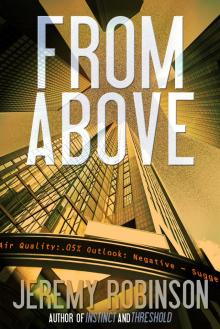 From Above - A Novella
From Above - A Novella Flux
Flux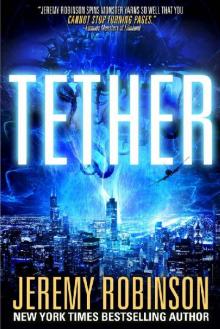 Tether
Tether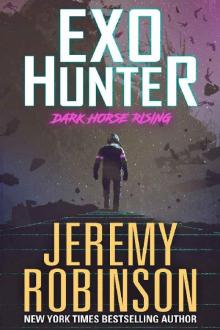 Exo-Hunter
Exo-Hunter Pulse
Pulse Cannibal
Cannibal Omega: A Jack Sigler Thriller cta-5
Omega: A Jack Sigler Thriller cta-5 Flood Rising (A Jenna Flood Thriller)
Flood Rising (A Jenna Flood Thriller)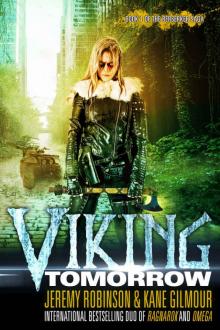 Viking Tomorrow
Viking Tomorrow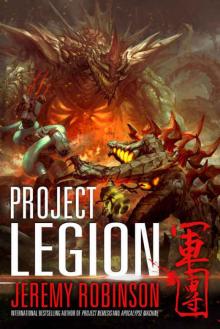 Project Legion (Nemesis Saga Book 5)
Project Legion (Nemesis Saga Book 5) BENEATH - A Novel
BENEATH - A Novel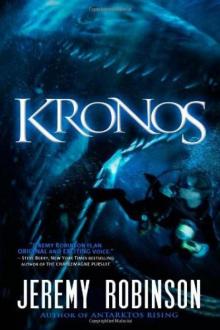 Kronos
Kronos SecondWorld
SecondWorld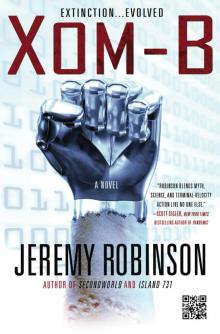 XOM-B
XOM-B Forbidden Island
Forbidden Island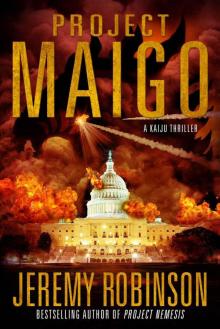 Project Maigo
Project Maigo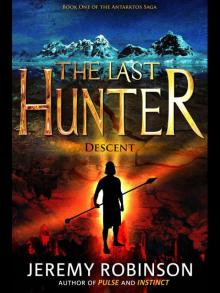 The Last Hunter - Descent (Book 1 of the Antarktos Saga)
The Last Hunter - Descent (Book 1 of the Antarktos Saga)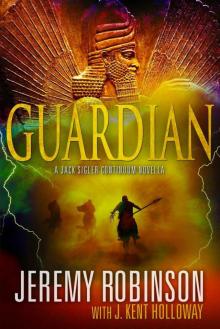 Jack Sigler Continuum 1: Guardian
Jack Sigler Continuum 1: Guardian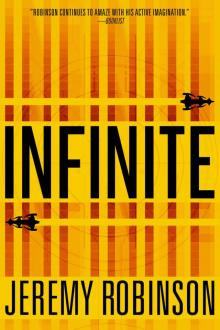 Infinite
Infinite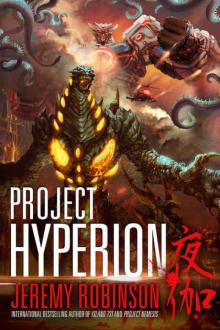 Project Hyperion
Project Hyperion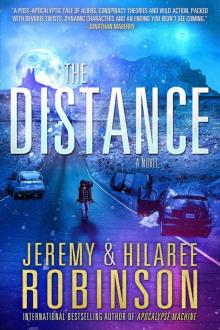 The Distance
The Distance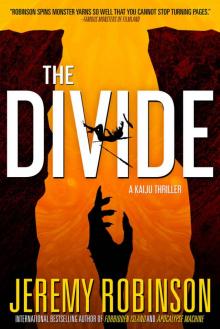 The Divide
The Divide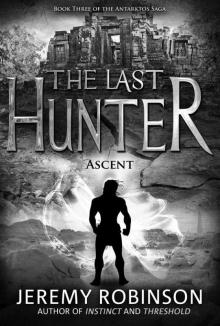 The Last Hunter - Ascent (Book 3 of the Antarktos Saga)
The Last Hunter - Ascent (Book 3 of the Antarktos Saga)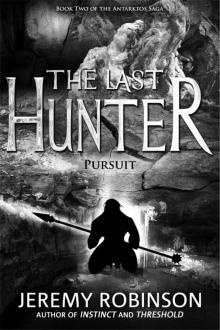 The Last Hunter - Pursuit (Book 2 of the Antarktos Saga)
The Last Hunter - Pursuit (Book 2 of the Antarktos Saga)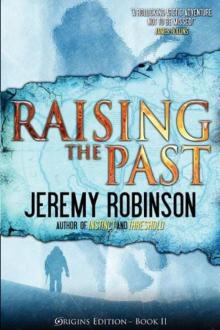 Raising the Past
Raising the Past The Others
The Others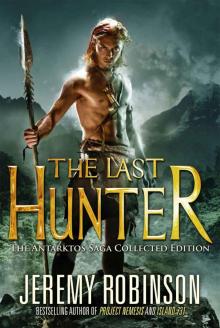 The Last Hunter - Collected Edition
The Last Hunter - Collected Edition Threshold
Threshold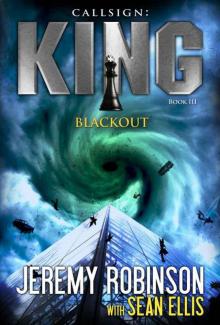 Blackout ck-3
Blackout ck-3 Antarktos Rising
Antarktos Rising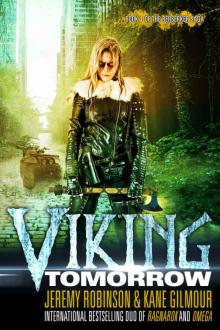 Viking Tomorrow (The Berserker Saga Book 1)
Viking Tomorrow (The Berserker Saga Book 1)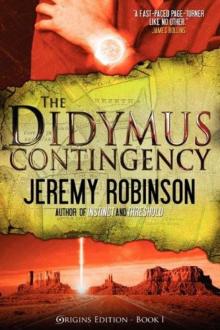 The Didymus Contingency
The Didymus Contingency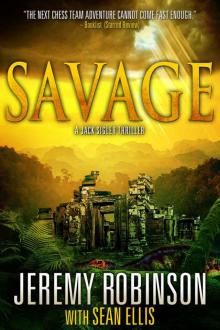 Savage (Jack Sigler / Chess Team)
Savage (Jack Sigler / Chess Team)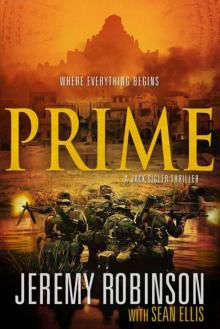 Prime
Prime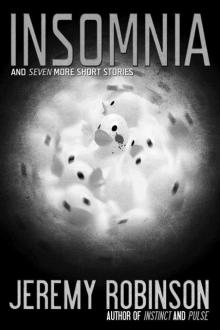 Insomnia and Seven More Short Stories
Insomnia and Seven More Short Stories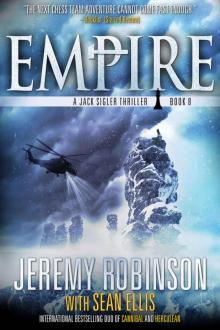 Empire (A Jack Sigler Thriller Book 8)
Empire (A Jack Sigler Thriller Book 8)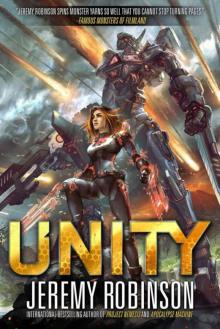 Unity
Unity Instinct
Instinct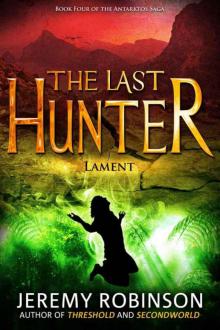 The Last Hunter - Lament (Book 4 of the Antarktos Saga)
The Last Hunter - Lament (Book 4 of the Antarktos Saga)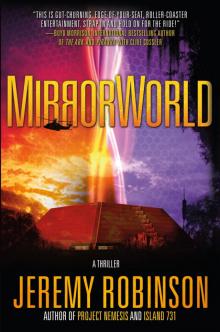 MirrorWorld
MirrorWorld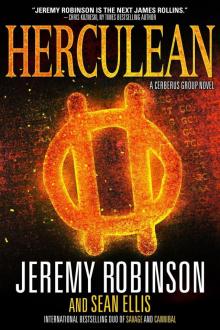 Herculean (Cerberus Group Book 1)
Herculean (Cerberus Group Book 1) Island 731
Island 731 Omega: A Jack Sigler Thriller
Omega: A Jack Sigler Thriller Patriot (A Jack Sigler Continuum Novella)
Patriot (A Jack Sigler Continuum Novella)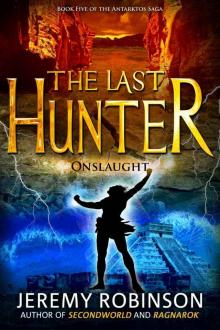 5 Onslaught
5 Onslaught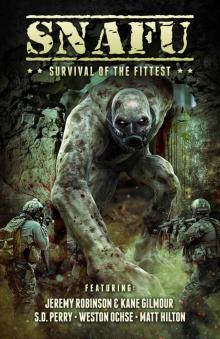 SNAFU: Survival of the Fittest
SNAFU: Survival of the Fittest Helios (Cerberus Group Book 2)
Helios (Cerberus Group Book 2)